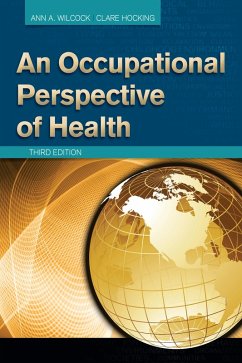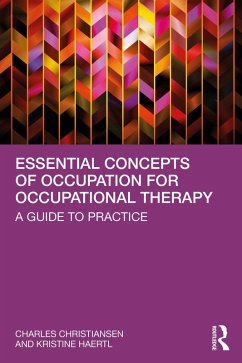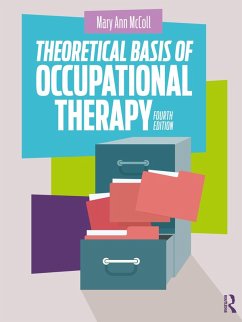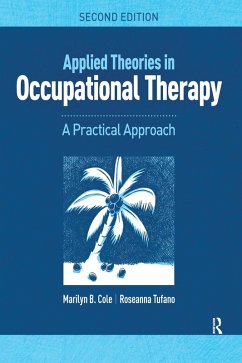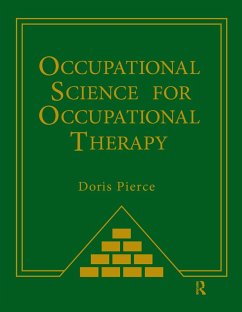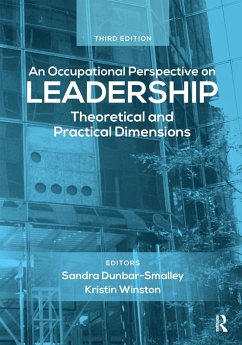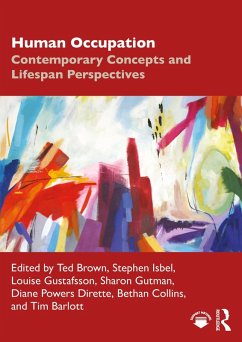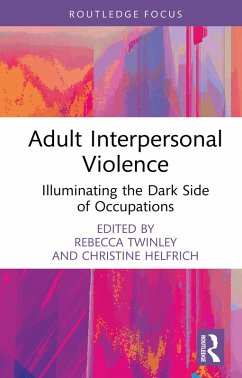
An Occupational Perspective of Health (eBook, ePUB)
Versandkostenfrei!
Sofort per Download lieferbar
72,95 €
inkl. MwSt.
Weitere Ausgaben:

PAYBACK Punkte
36 °P sammeln!
For nearly 20 years, An Occupational Perspective of Health has been a valuable text for health practitioners with an interest in the impact of what people do throughout their lives. Now available in an updated and much-anticipated Third Edition, this unique text continues the intention of the original publication: it encourages wide-ranging recognition of occupation as a major contributor to all people's experience of health or illness. It also promotes understanding of how, throughout the world, "population health" as well as individual well-being is dependent on occupation. At international ...
For nearly 20 years, An Occupational Perspective of Health has been a valuable text for health practitioners with an interest in the impact of what people do throughout their lives. Now available in an updated and much-anticipated Third Edition, this unique text continues the intention of the original publication: it encourages wide-ranging recognition of occupation as a major contributor to all people's experience of health or illness. It also promotes understanding of how, throughout the world, "population health" as well as individual well-being is dependent on occupation.
At international and national levels, the role of occupation in terms of the physical, mental, and social health of all individuals and populations remains poorly understood and largely overlooked as an inevitable and constant factor. An Occupational Perspective of Health, Third Edition by Drs. Ann Wilcock and Clare Hocking, in line with directives from the World Health Organization (WHO), encourages practitioners of public health, occupational therapy and others to extend current thinking and practice and embrace a holistic view of how occupation and health interact.
Addressed in the Third Edition:
The connection of health and occupation is held to be fundamental, although ideas about both have altered throughout time as environments and cultures have evolved. To improve interdisciplinary understanding, An Occupational Perspective of Health, Third Edition explains the concepts of attaining, maintaining, or reclaiming population health through occupation.
Instructors in educational settings can visit www.efacultylounge.com for additional materials to be used for teaching in the classroom.
Practitioners and students of occupational therapy, health sciences, and public or population health will benefit from and relate to An Occupational Perspective of Health, Third Edition.
At international and national levels, the role of occupation in terms of the physical, mental, and social health of all individuals and populations remains poorly understood and largely overlooked as an inevitable and constant factor. An Occupational Perspective of Health, Third Edition by Drs. Ann Wilcock and Clare Hocking, in line with directives from the World Health Organization (WHO), encourages practitioners of public health, occupational therapy and others to extend current thinking and practice and embrace a holistic view of how occupation and health interact.
Addressed in the Third Edition:
- An explanation of how individual and population health throughout the world is impacted by all that people do
- A drawing together of WHO ideas that relate to health through occupation, and how people individually and collectively feel about, relate to others, and grow or diminish through what they do
- A multidisciplinary orientation to promote health and reduce illness by increasing awareness and understanding of the impact of occupations across sleep-wake continuums throughout lifespans and communities
The connection of health and occupation is held to be fundamental, although ideas about both have altered throughout time as environments and cultures have evolved. To improve interdisciplinary understanding, An Occupational Perspective of Health, Third Edition explains the concepts of attaining, maintaining, or reclaiming population health through occupation.
Instructors in educational settings can visit www.efacultylounge.com for additional materials to be used for teaching in the classroom.
Practitioners and students of occupational therapy, health sciences, and public or population health will benefit from and relate to An Occupational Perspective of Health, Third Edition.
Dieser Download kann aus rechtlichen Gründen nur mit Rechnungsadresse in A, B, BG, CY, CZ, D, DK, EW, E, FIN, F, GR, HR, H, IRL, I, LT, L, LR, M, NL, PL, P, R, S, SLO, SK ausgeliefert werden.




